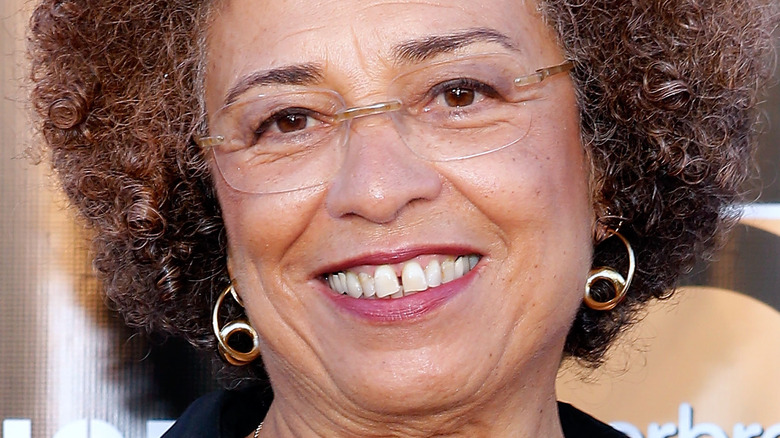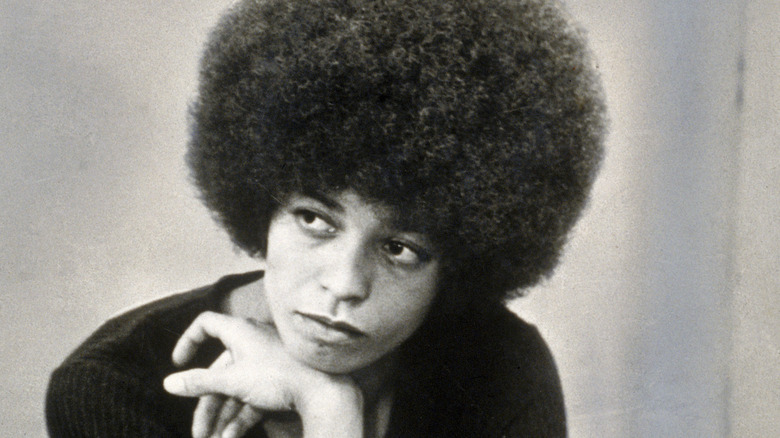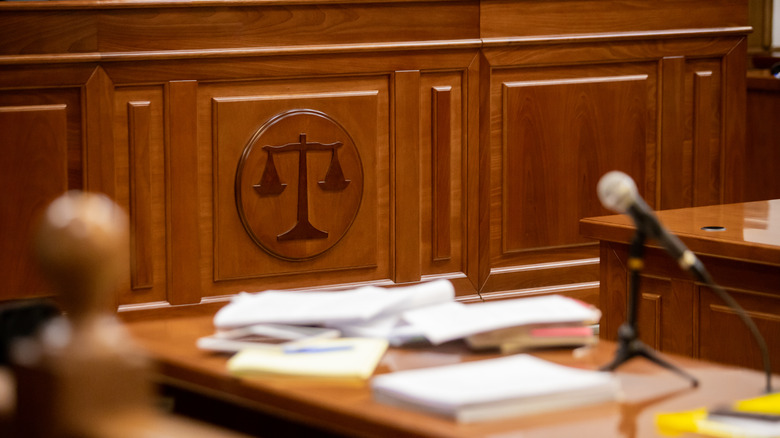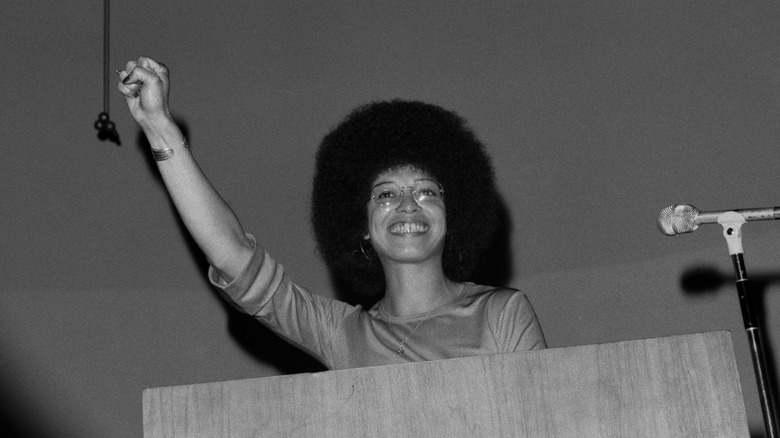The Real Reason Angela Davis Was Acquitted Of Murder
Political activist Angela Davis is known for being a champion for civil rights and an educator, as well as her ties to both the Communist and Black Panther parties (per ThoughtCo). Born and raised in Birmingham, Alabama, Davis was hired as a professor for UCLA in 1969 (per UCLA Newsroom). However, ColorLines states that she was fired two days later due to her Communist affiliation. Soon after, Davis was added to the FBI's Top 10 Most Wanted Fugitives list.
According to JSTOR Daily, guns registered in her name were used in a shootout in Marin County, California. As a result, a warrant was issued for Davis' arrest for kidnapping and first-degree murder. She went into hiding but was arrested in New York City in October 1970 (per History). Davis insisted that she was innocent. This led to the "Free Angela" campaign and support from famed musicians including John Lennon, Yoko Ono, and the Rolling Stones. Davis was presumed to be involved in the shootout due to her known support of the Soledad Brothers, three prisoners that were accused of killing a prison guard.
Angela Davis' connection to the Soledad Brothers
In 1960 a Black man, George Jackson, was accused of stealing $70 from a gas station (via Ozy). The then 18-year-old received a sentence of one year to life. During his incarceration, Jackson became politically active. As he put it, "I met Marx, Lenin, Engels and Mao when I entered prison, and they redeemed me." Jackson spread his knowledge to fellow inmates, which led to protests against conditions in San Quentin. Eventually, he was sent to Soledad Prison to ease tensions. Rebel Archives in the Golden Gulag explains that while imprisoned at Soledad, Jackson and two other inmates, Fleeta Drumgo and John Clutchette, were accused of murdering a white prison guard. The three became known as the Soledad Brothers.
The murder was pinned on Jackson because of his political activism, and because three other Black inmates, including a friend of Jackson's, had been killed by a prison guard shortly before the murder. In other words, the prison guard's murder was seen as retribution. The Freedom Archives states that there was no evidence to tie them to the guard's murder. Regardless, they were facing a death sentence.
According to The Arthur Ashe Legacy, Davis championed the Soledad Brothers' release. Davis knew Jackson's younger brother, Jonathan Jackson. He reportedly worked at some of her rallies and was her friend.
The California courtroom shootout
Regarding the nature of her relationship with George Jackson, Angela Davis revealed in the 2012 documentary "Free Angela and All Political Prisoners" that, "Emotional relationships are really important when your freedom is so restricted," (via Essence). Whatever the case, Davis was unaware of what was going to happen next. The Freedom Archives writes that on August 7, 1970, Jonathan Jackson decided to take justice into his own hands. Armed with three guns, he walked into the Marin County courthouse and took hostages, including a judge, and provided guns to inmates.
Jackson hoped his efforts would free the Soledad Brothers, including his older brother. However, when Jackson attempted to leave the premises in a van with the hostages and the prisoners, police opened fire. Jonathon Jackson, two inmates, and the judge all died in the shootout. When it was uncovered that the guns used by Jackson were registered to Davis, a warrant was issued for her arrest.
Per Essence, Davis admitted that the guns were hers, but that she had purchased them for self-defense. She later stated, "I tried to understand why he [Jackson], tried to do something like that," (via Essence). In response to his brother's actions, George Jackson asserted, "I'm saying that there was no conspiracy. That Jonathan — a 17-year-old man child — was working according to the dictates of his own mind."
The case against Angela Davis was too weak
Upon her arrest, Rebel Archives in the Golden Gulag states that Angela Davis was put into solitary confinement for months. Fellow activist Charlene Mitchell later wrote that Davis had to "fight vigorously for even the most meager conveniences of detention," (via JSTOR Daily). She was released on bail in February 1972 and her trial began in March of that year (per History). It was clear early on that the prosecution had no case against Davis, and that the evidence was politically motivated. Simply put, the prosecution wanted to make an example of Davis and what could occur to other activists.
In the end, Davis was acquitted of all charges by an all-white jury in June 1972 (per The New York Times). The Arthur Ashe Legacy states that the jury concluded that owning the guns used in the shootout did not automatically mean that she was involved in the incident. After her acquittal, Davis called for prison reform and continues to champion prisoner's rights. Per UCLA Newsroom, she went on to teach feminist studies and research the American prison complex at UC Santa Cruz from 1991 to 2008. Tragically, George Jackson died during an attempted prison escape in 1971 (via The New York Times).



